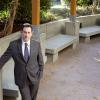News
Jul 25 2017 | Stanford Magazine
People who think they’re couch potatoes tend to have shorter lives.
Jul 25 2017 | NeuWrite West
“I’m interested in studying neuroscience. Where could I learn more about research topics and other aspects of life as a neuroscience researcher?”
Jul 24 2017 | Stanford Medicine - Neurosurgery
"I think about the things that people have said or done to try to prevent me from getting where I am now, and all I can do is make sure that I’m doing the best job that I can every day, and try to set an example for the next generation of scientists and physicians." - Melanie Hayden-Gephart, MD
Jul 24 2017 | Stanford Medicine - Neurosurgery
"No matter what anyone says to you, you can be just as good at science, you might learn things differently, or at a different pace, but you can get there." - Ciara D. Harraher, MD, MPH
Jul 21 2017 | NeuWrite West
Every minute of the day, our brains are bombarded with enormous amounts of information. Lights, sounds, smells and tastes of all sorts are rapidly coming into our brains, often at the same time. Yet somehow we are able to effortlessly process our complex environments and accomplish our goals. How...
Jul 20 2017 | Stanford News
Stanford researchers found that U.S. adults who believed that they were less active than their peers died younger than those who believed they were more active – even if their actual activity levels were similar.
Jul 20 2017 | Insights by Stanford Business
A new study examines the battle between idealized attitudes and those we actually have.
Jul 17 2017 | Stanford Medicine - News Center
Stanford researchers measured brain activity in PTSD patients before and after psychotherapy and found that they could predict how well patients would respond to treatment.
Jul 11 2017 | Stanford Medicine - News Center
Stanford Medicine is using a new software system that combines imaging from MRIs, CT scans and angiograms to create a three-dimensional model that physicians and patients can see and manipulate — just like a virtual reality game.
Jul 11 2017 | NeuWrite West
“Theoretically speaking if the brain stops aging and growing at a certain point would it be possible to transplant the brain to a younger body and it continue to operate normally as it did in the previous body?” — Nolan Andreson












